A Glimpse into the Impact of SEL
At YESS Institute, our mission is to empower students with the social and emotional skills they need for success, not just academically, but in all aspects of life.
Over the past month, Denver North High School’s YESS Program has been hard at work, focusing on social emotional learning (SEL) topics such as self-awareness, social awareness, healthy relationships, and responsible decision-making.
Let’s take a closer look at the exciting classroom activities and the impact of SEL on our Denver North High School students!
Monthly Focus: Building Foundations with SEL
The month of September – the beginning of the 2023-24 school year – started with a focus on the foundations of SEL. North High School students in the YESS Program kicked off the school year with mentor-mentee matches (a pivotal component of YESS Institute SEL Programs), creating peer-to-peer connections that form the roots of a classroom community. In the early weeks of the month, North High School’s YESS Students aimed to learn each other’s names, get acquainted, and establish a mutual sense of belonging amongst classmates.
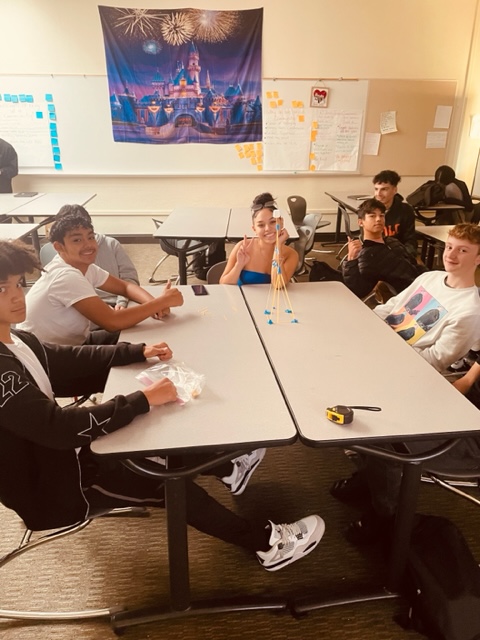

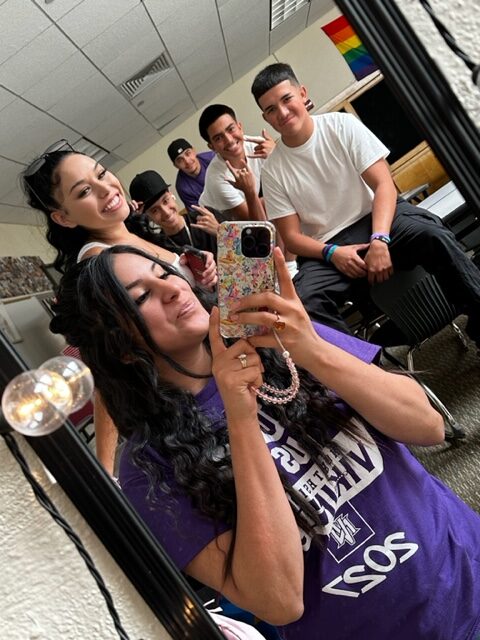
“This month has been a great start. We have been learning and practicing SEL skills through lessons and also through our interactions. We have started building a community that is comfortable to talk in Community Circle, talk with peers, do grade checks, and work on lessons. Mentors have taken on a huge leadership role. Mentors are engaging with peers in class, walking around and helping others, and assisting mentees on improving their grades.”
-Denver North High School YESS Program Manager, Cheyenne Bueno
Classroom Activities: Learning Through Engagement
One highlight activity in the Denver North High School YESS Classroom was the “Peer Slides” exercise; students were given 100 questions to choose from and took 20 minutes asking the person their were paired with any of the questions that they wanted.
These conversations and insights were transformed into slides, allowing each student to present/introduce their partner to the class. This activity was an opportunity for students to practice public speaking, albeit with some initial jitters.
A creative activity that followed was the “Coat of Arms” activity. Students selected personal identities and used symbolism to represent themselves on a shield. This exercise not only encouraged self-awareness but also highlighted the unique qualities that make each student exceptional.
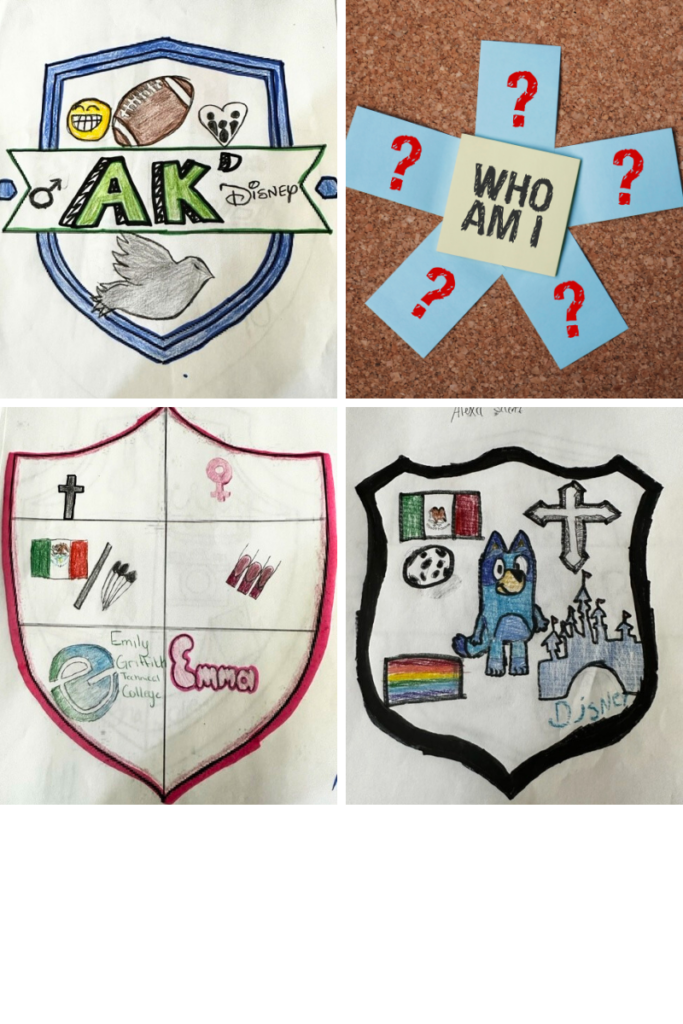
Classroom Activities: Classroom Agreements
As the classroom community grew, the students shifted the focus to defining their Classroom Agreements.
Classroom Agreements are also a practical and valuable tool for integrating SEL into the classroom; they help foster a safe and respectful environment, teach crucial emotional intelligence skills, and empower students to take responsibility for their actions and relationships.
By involving students in the agreement-making process, YESS Program Managers – the talented individuals who make our YESS Classrooms possible – can create a sense of shared ownership and commitment to SEL principles, ultimately enhancing the overall learning experience.
Here are some other reasons why creating Classroom Agreements is an important aspect of SEL:
- Establishing a Safe Environment: Classroom Agreements help set the tone for a safe and supportive learning environment. When students actively participate in developing these agreements, they feel a sense of ownership and responsibility for maintaining a positive atmosphere. This helps students feel comfortable expressing their thoughts and emotions, a fundamental aspect of SEL.
- Promoting Respect and Inclusivity: Classroom Agreements often include principles like respect, active listening, and valuing diverse perspectives. By discussing and agreeing upon these principles as a class, students learn to respect one another’s boundaries, opinions, and experiences.
- Conflict Resolution: Inevitably, conflicts will arise in any classroom. Classroom Agreements provide a framework for addressing and resolving conflicts in a healthy manner. Students can refer back to these agreements when disagreements occur, helping them find common ground and maintain positive relationships.
- Teaching Responsibility: Developing Classroom Agreements teaches students that their actions have an impact on the classroom community, and they must uphold their commitments to maintain a positive learning environment.
- SEL Skill Development: Creating Classroom Agreements involves critical SEL skills such as self-awareness, self-regulation, and effective communication. Students must reflect on their own needs and feelings, consider the needs and feelings of others, and communicate their thoughts and expectations clearly and respectfully.
- Life Skill Application: Skills developed through creating and adhering to Classroom Agreements are highly transferable to real-life situations. Students learn how to collaborate, set boundaries, and communicate effectively, which are essential skills for personal and professional success.
- Positive Classroom Culture: Classroom Agreements contribute to the development of a positive classroom culture. When students actively participate in shaping the norms and expectations, they are more likely to take ownership of their behavior and contribute to a harmonious and productive learning environment.
Student Reactions: Challenges and Triumphs
Facing the class to present their “Peer Slides” was a challenge for many students. Over 20 students expressed nervousness about public speaking. However, as a class, they recognized and acknowledged this shared fear. For our North High School Program Manager, Cheyenne Bueno, witnessing one student’s transformation from fear to pride after her presentation, was inspiring. The support from her mentor was a powerful reminder of the compassionate community we work to build inside our classrooms.
“Many students were terrified of getting up and speaking in front of the class…so we talked about how terrifying it is for so many students and how we could make it easier for each student that was presenting. During one presentation, the class was so patient and supportive; The mentor lead paid close attention and when the student struggled on a word, he would jump in and help her pronounce it, which was amazing to see.”
-Denver North High School YESS Program Manager, Cheyenne Bueno
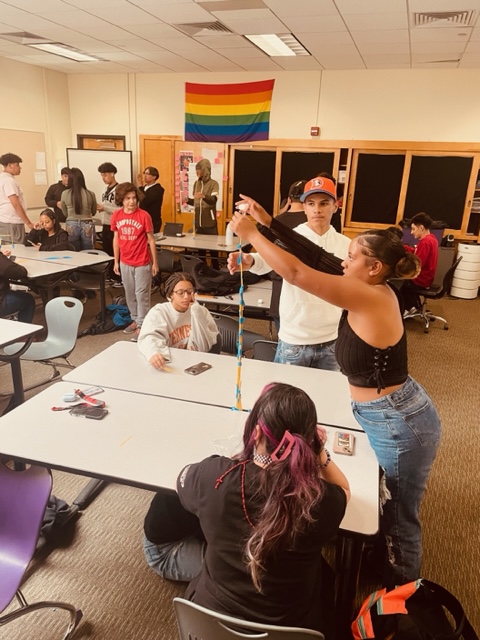
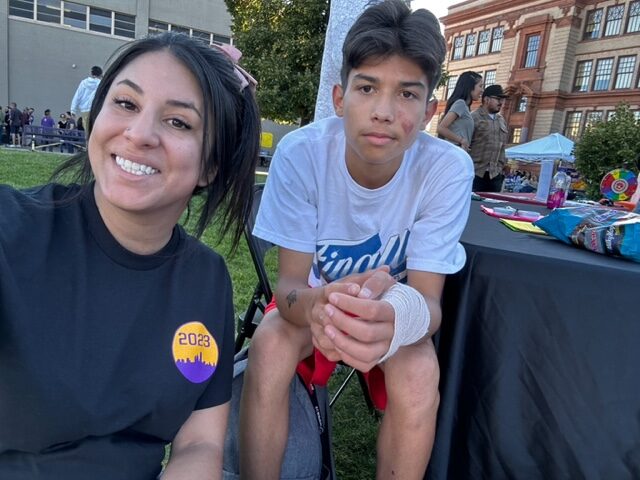
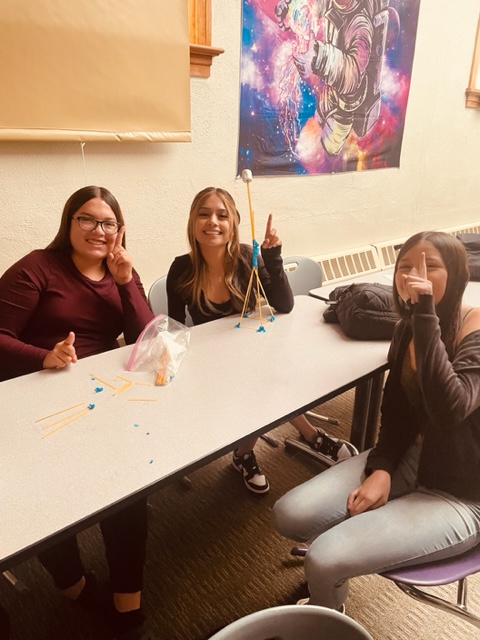
Community Circles
A “Community Circle” activity in SEL is a structured group discussion or meeting format that promotes several key SEL competencies and aims to build a sense of community and connection among participants.
Here’s how it works at YESS:
Formation: Participants sit in a circle, which creates an inclusive and equal setting where everyone can see and hear each other. The circle formation signifies that all voices are valued and that everyone has a role to play in the community.
Facilitator: A facilitator, often a Program Manager or student mentor, guides the circle. The facilitator’s role is to create a safe and respectful space, set the agenda or topic for discussion, and ensure that everyone has an opportunity to speak.
Agenda/Topic: Each community circle typically centers around a specific topic or theme relevant to SEL, personal growth, or community building. The chosen topic can vary widely, from discussing feelings and emotions to addressing specific issues or challenges within the group.
Talking Piece: Some community circles use a “talking piece” or “talking stick.” This object is passed around the circle, and only the person holding it is allowed to speak. This practice encourages active listening and ensures that each participant has a chance to share without interruption.
Guidelines: The facilitator often sets guidelines or agreements for the circle. These guidelines may include active listening, speaking from the heart, respecting confidentiality, and being open-minded. These rules help create a safe and respectful environment for sharing.
Sharing: Participants take turns sharing their thoughts, feelings, or experiences related to the chosen topic. They can pass the talking piece when they are done speaking, or it can move around the circle systematically.
Active Listening: Active listening is a crucial component of community circles. Participants are encouraged to listen attentively to each speaker without judgment. This helps build empathy and understanding among group members.
Reflection and Responses: After someone shares, others in the circle may have an opportunity to reflect on what was said or offer supportive responses. This can lead to deeper discussions and connections among participants.
Closing: The facilitator typically closes the circle by summarizing key points, expressing gratitude for participants’ contributions, and reinforcing the importance of the community’s values and connections.
Community circles are a versatile and effective tool for building positive classroom or community culture, enhancing SEL skills, and creating a safe and inclusive space for meaningful dialogue and connection.
Supportive Voice: A Perspective from the YESS Classroom

This month, the Denver North High School YESS Classroom received a powerful observation from an administrator:
During a community circle, a Dean witnessed the impact of SEL in action in one YESS Classroom. He recognized the value of the class’ daily community check-ins, where students share their feelings and a fun fact; this simple practice creates a safe space for expression and sets a positive tone for the day.
The question of the day was “How are you feeling on a scale of 1-10 and what is your favorite Disney Movie?”
The Dean left a note commending Cheyenne’s efforts, reinforcing the importance of SEL in the school and demonstrating the support the school has behind YESS Programs.
A Student Story from the YESS Classroom
“A student came in during Advisement today to get help with an essay for his History class. He was writing about his identity and how History plays a role in who we are. Even though this was an assignment from a different class, it aligned perfectly with the SEL competency Self Awareness and we used the Coat of Arms assignment to help us understand our identity.
This was a memorable moment because as we were working, he said, “Wow, now I see why everyone likes you so much… This class is genuinely a lot of help”. This is his first year in our YESS class. His attendance has improved a lot and we have built a great relationship where he is comfortable opening up and asking for help.”
-Denver North High School YESS Program Manager, Cheyenne Bueno
Join the YESS Journey
This glimpse into our Denver North High School program showcases the transformative power of SEL. In the YESS Classroom, we’re not just building better students; we’re nurturing well-rounded individuals who are equipped to thrive in all aspects of life. If you’re curious about how YESS programs can align with the needs of your school, connect with us today!
Together, we can continue to celebrate the growth and connections that SEL brings to our students and communities.